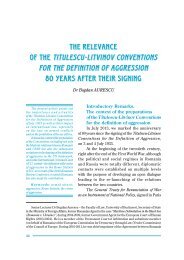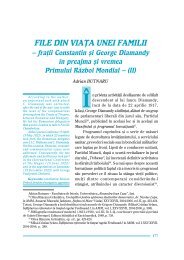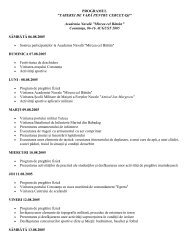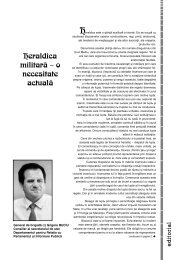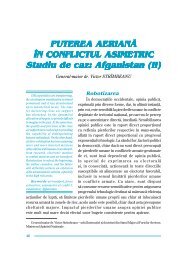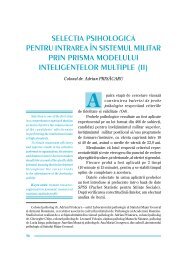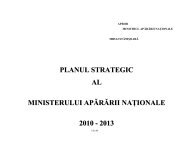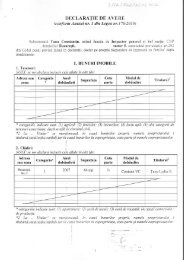Create successful ePaper yourself
Turn your PDF publications into a flip-book with our unique Google optimized e-Paper software.
and tried to revise radically the status of the<br />
Straits. At the same time it demanded the deployment<br />
of Soviet bases in the Straits, had territorial<br />
claims along the coasts of the Black Sea and accused<br />
Turkey – not in vain – that it was not impartial<br />
as a neutral Power but supported the Nazis and<br />
acted against Russia. 22 These Soviet views were<br />
expressed officially by a Note on August 1946 which<br />
proposed the free at any time transit and navigation<br />
of all merchant ships and war vessels of the<br />
Black Sea Powers and embargo for all other war<br />
ships belonging to non-Black Sea Powers with the<br />
exception of some cases, non-defined in the Note.<br />
The Soviet Union intended to create a new status<br />
exclusively run by Black-Sea Powers so as to keep<br />
away all other states. It also wished to take over<br />
the defence of the Straits in cooperation with Turkey.<br />
Turkey was not objecting to a reform of the<br />
existing status, but denied to discuss any proposal<br />
which could offend its sovereign rights and rejected<br />
Moscow’s request for bases, insisting on<br />
the necessary involvement of Great Britain and<br />
USA to the formation of the new regime. The Turkish<br />
government was aware that the Russian involvement<br />
to the defence of the Straits would downgrade<br />
their country’s strategic position and bring<br />
them dangerously close to a Power with a different<br />
political theory aiming to expand its international<br />
influence. The strong Soviet pressure<br />
brought Turkey closer to England and the USA,<br />
which both eagerly showed their interest to participate<br />
in a revising conference on the Straits. At<br />
the same time, the United States expressed their<br />
objection to the formation of a new status with<br />
local features, as well as to the Soviet demand to<br />
participate to the defence of the region.<br />
known to the international community exchange.<br />
How else can this attitude be explained? Two Great<br />
Powers had no objection to lose their few rights of<br />
access of their war ships to the Black Sea and<br />
were abandoning this maritime region to the Soviet<br />
sovereignty.<br />
This diplomatic activity had no results and<br />
nothing happened. The “cold war” also contributed<br />
to this as gradually the relations between the<br />
East and the West were getting worse. The Truman<br />
Doctrine which literally saved so many states including<br />
Turkey, brought it closer to the West. 23 On<br />
4 April 1949, the signing of the North Atlantic<br />
Treaty Organisation, formed a strong group of liberal<br />
states faithful to the aims and principles of<br />
the UN Chart, with strong desire to live peacefully<br />
with other people and their governments. On February<br />
1952 the Alliance was enlarged by the simultaneous<br />
accession of Turkey and Greece. 24<br />
Turkish-Soviet relations were not any more at a<br />
satisfactory level. There was small improvement<br />
on 30 May 1953 when the Soviet Union gave up its<br />
claims on Turkish territories. 25<br />
The Montreux Convention had a twenty<br />
years’ validity.<br />
The first country to submit precise proposals,<br />
was the USA on 2 November 1945. The first 3<br />
points of the American Note satisfied the Soviet<br />
requests. The Straits would remain open to the<br />
passage of all merchant ships even in time of war,<br />
as well as to the war vessels of the Black-Sea Powers,<br />
while the passage of all other war ships was<br />
not permitted unless agreed otherwise by the<br />
Black-Sea Forces or unless the ships were part of<br />
a UN operation. These views and the lack of reactions<br />
from the British side, surprises us even at<br />
present. At the time, the interest of these two Great<br />
Forces on restricting the Soviet exit to the Mediterranean<br />
was possibly low or there was an un-<br />
66 ����� Review of Military History �����<br />
26 In 1956 the twenty years expired,<br />
but it was not revised and is still into force. It is a<br />
fact that it operated and continues to do so in a<br />
satisfactory way. The Soviet Union used its rights<br />
and its war ships were crossing very often the<br />
Straits in their way into the Mediterranean. Many<br />
submarines coming from Arctic and Baltic bases27 also joined the Soviet fleet. The United States of<br />
America have not signed the Convention, but they<br />
have fully respected it. In their efforts to keep it<br />
alive, they have been sending their ships to the<br />
Black Sea following carefully its provisions. Turkey<br />
though created many problems despite its contractual<br />
obligation. It tried to regulate the navigation<br />
regime of the Straits with unilateral acts. It<br />
issued relevant Turkish regulations in 1994 and<br />
1998 as well as restricting navigating measures in<br />
November 2002. Within this framework, Turkey<br />
expressed strongly its wish to replace the names<br />
“Straits of Dardanelles, Sea of Marmara and<br />
Bosphorus” or “Straits” 28 that appear on the terms<br />
of the Convention by others such as Turkish Straits<br />
or Cannakale Straits, Instanbul Straits in order to<br />
include them gradually to their Regulations and to<br />
overthrow the validity of the Montreux Conven-



